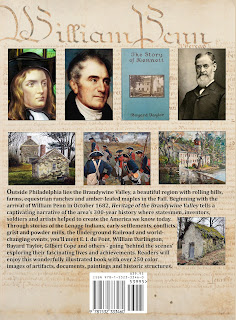HERITAGE OF THE BRANDYWINE VALLEY
The Brandywine Valley outside Philadelphia is a region of rolling hills, dairies, equestrian ranches and amber-leafed maples in the Fall. It was also an important part of our nation's heritage. When
William Penn was granted title to roughly 45,000 square miles of territory in what would become the colony of Pennsylvania on March 4, 1681, he had no idea it would be the template for creating the nation we know today. In so many respects, Pennsylvania was a crucible which helped form the society, the economy and the government we have now more than 300 years later.
A new book "Heritage of the Brandywine Valley" highlights this rich heritage, delving into the fascinating details of the Lenni-Lenape Indians, early settlers, conflicts, grist and powder mills, the Underground Railroad and world-changing events which occurred there over the last three centuries. William Penn named the first three counties- Chester, Bucks and Philadelphia- as the blueprint of his "Holy experiment" and his framework for the government of Pennsylvania in many ways laid the groundwork for principles enshrined in the U.S. Constitution more than a century later.
The Brandywine Valley was home to so many patriots, soldiers, statesmen, authors, inventors and scientists who all
participated in creating the framework for the American economic and banking systems, our governmental structure and discoveries in science, medicine, technology and business which literally changed the world. Learning of the achievements of just some of the early players in this drama, you come to understand just how important men like E.I. du Pont, Thomas McKean, John Morton, Humphry Marshall, Samuel Barber, Bayard Taylor, William Darlington and others were in shaping the country we all know today.
This series will delve into the fascinating history of this region in the coming weeks and provide readers with interesting and useful information for better understanding our rich heritage. By understanding the past, we are better prepared for the future...

